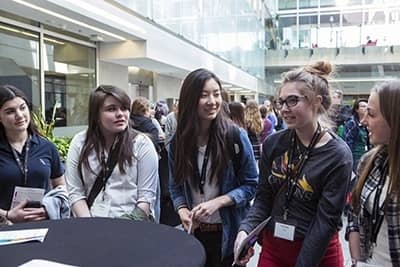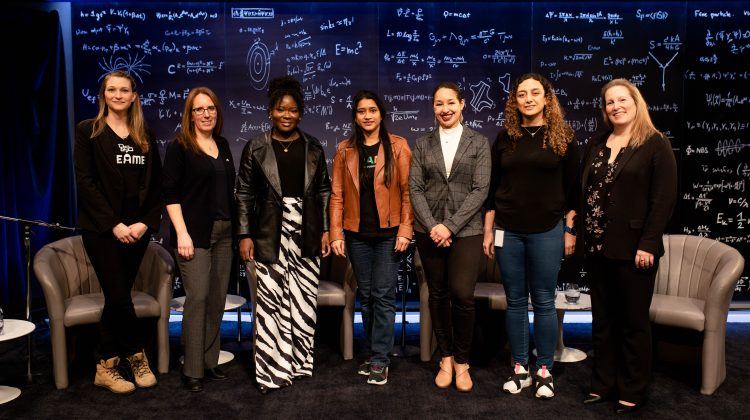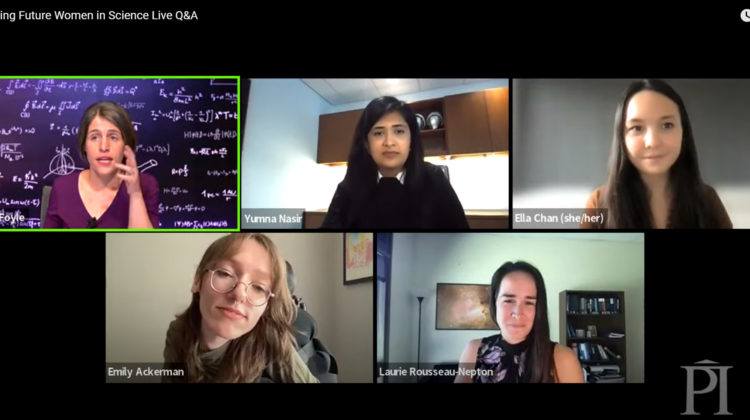Inspiring Future Women in Science
A half-day conference at Perimeter brought 200 high school girls eyeing a future in STEM together with successful women at all stages of their careers.

Natalie Panek dreams of becoming an astronaut. Sage Franch wants to change the world for women in tech. Virginie Hotte-Dupuis works to put female scientists in the global spotlight. They came together at Perimeter Institute on April 15, to share those dreams with more than 200 girls at the annual “Inspiring Future Women in Science” conference.
This year, the girls were also joined by a special guest: Canadian Prime Minister Justin Trudeau, who came to Perimeter to speak about the value of science and innovation, and to announce $50 million in federal funding for the Institute. After the announcement, the Prime Minister surprised the girls by popping into the auditorium to speak.
“I know you think you’re sitting here looking at women who happen to be scientists,” he said to the astonished crowd. “They are actually scientists who happen to be women.”
The overlap between the Prime Minister’s visit and the conference was a coincidence, but an apt one. His impromptu talk was an inspiring moment in a conference that is all about inspiration.
The three keynote speakers, four panelists, and 13 mentors followed with talks of their own. They spoke about the twists and turns in their career paths, the challenges of confronting stereotypes and self-doubt, and ultimately the joy and rewards of doing things they love.
In turn, the girls asked frank questions about discovering passions and fitting those with careers, about dealing with gender bias in science, about stepping outside your comfort zone.
“Do you ever feel like you’re in over your head, like you don’t really understand what’s going on?” an audience member asked the panel.
“All the time,” said two or three of them, more or less in unison. “Every day.”
To be a scientist is to grapple with the unknown. The whole field is, by definition, in over its head. But, the speakers pointed out, girls and women in particular often feel like imposters, not explorers. The “Inspiring Future Women in Science” conference aims to counter that feeling.
Over and over, the girls heard about the value of persistence and the need to embrace failure; the importance of seeking out mentors; and the need for more visible role models for women in science and technology.
Panek, the aspiring astronaut who works on space robotics, talked about applying for a NASA fellowship four times, being rejected four times, and finally landing an internship when she called to get feedback on her rejected application.
Franch, a software developer, talked about looking for the stories of young women who get told “you don’t look like you can code,” not finding them, and deciding to create a platform to tell her own.
Virginie Hotte-Dupuis, who helps run the L’Oréal‐UNESCO programs supporting women and girls in science, said that most people surveyed can name one only female scientist – Marie Curie – and a majority think that women don’t have what’s necessary to succeed in scientific and technical fields.
“We need to change that,” she said.
“Astronauts are often said to have the right stuff,” said Panek. “I want you to know that your stuff is the right stuff.”
Many of the girls came away eager to test their own mettle. “I felt like I discovered a world of possibilities. I thought of science as being either chemistry or biology or physics,” says Erum Hyder, a student from Cedarbrae Collegiate Institute in Scarborough. “But there are hundreds of things you can do.”
“The three keynote speakers all talked about finding mentors and getting involved in extracurricular opportunities and even hobbies,” says Alessia Caci, a student at Sir John A. MacDonald Secondary School in Waterloo. “That was incredible, because if you think about it, those are things that we can do. We can start right now.”
The Prime Minister perhaps said it best. “Congratulations on being here, because folks believe in you and recognize your extraordinary abilities to contribute,” he told the girls.
“Being able to sit here and exchange and discuss is a good thing for all of you. Let me tell you, it’s a better thing for the country. It’s a better thing for the future we’re going to build.”






















































































